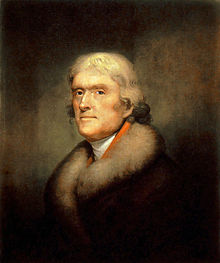Our website is made possible by displaying online advertisements to our visitors.
Please consider supporting us by disabling your ad blocker.
Presidency of Thomas Jefferson
 | |
| Presidency of Thomas Jefferson March 4, 1801 – March 4, 1809 | |
| Cabinet | See list |
|---|---|
| Party | Democratic-Republican |
| Election | |
| Seat | White House |
|
| |
| ||
|---|---|---|
|
Early life and political career
3rd President of the United States
First term
Second term
Post-presidency
Legacy
 |
||
The presidency of Thomas Jefferson began on March 4, 1801, when Thomas Jefferson was inaugurated as the third President of the United States, and ended on March 4, 1809. Jefferson assumed the office after defeating incumbent president John Adams in the 1800 presidential election. The election was a political realignment in which the Democratic-Republican Party swept the Federalist Party out of power, ushering in a generation of Jeffersonian Republican dominance in American politics. After serving two terms, Jefferson was succeeded by Secretary of State James Madison, also of the Democratic-Republican Party.
Jefferson took office determined to roll back the Federalist program of the 1790s. His administration reduced taxes, government spending, and the national debt, and repealed the Alien and Sedition Acts. In foreign affairs, the major developments were the acquisition of the gigantic Louisiana Purchase from France in 1803, an embargo against trade with both Great Britain and France, and worsening relations with Britain as the United States tried to remain neutral in the midst of the Napoleonic Wars that engulfed Europe. He established a military academy, used the Navy to protect merchant ships from Barbary pirates in North Africa, and developed a plan to protect U.S. ports from foreign invasion by the use of small gunboats (a plan that proved useless when war came in 1812). He also authorized the Lewis and Clark Expedition to explore the Louisiana Territory and the Pacific Northwest.
During his second term, Jefferson's attention was focused on the trial of then former Vice President Aaron Burr for treason, which resulted in an acquittal, and on the issue of slavery, specifically the importation of slaves from abroad. In 1806, he denounced the international slave trade as a "violation of human rights" and called upon Congress to criminalize it. Congress responded by approving the Act Prohibiting Importation of Slaves the following year. Rising tensions between the United States and Britain dominated the final years of Jefferson's second term, as the Royal Navy began impressing sailors from American ships and attacking American shipping. Jefferson rejected war and instead used economic threats and embargoes that ultimately hurt the U.S. more than Britain. The disputes with Britain continued after Jefferson left office, eventually leading to the War of 1812.
Despite the economic and political troubles caused by naval tensions with Britain, Jefferson was succeeded by his preferred successor in the form of James Madison. His legacy remained highly influential until the American Civil War, but his reputation has ebbed and flowed since then. Nonetheless, in surveys of academic historians and political scientists, Jefferson is consistently ranked as one of the nation's most esteemed presidents.
Previous Page Next Page
رئاسة توماس جفرسون Arabic Kabinett Jefferson German Presidencia de Thomas Jefferson Spanish Présidence de Thomas Jefferson French הקבינט של ארצות הברית בממשל תומאס ג'פרסון HE Presidenza di Thomas Jefferson Italian Kabinet-Jefferson Dutch Gabinet Thomasa Jeffersona Polish Президентство Томаса Джефферсона Russian




